Paving
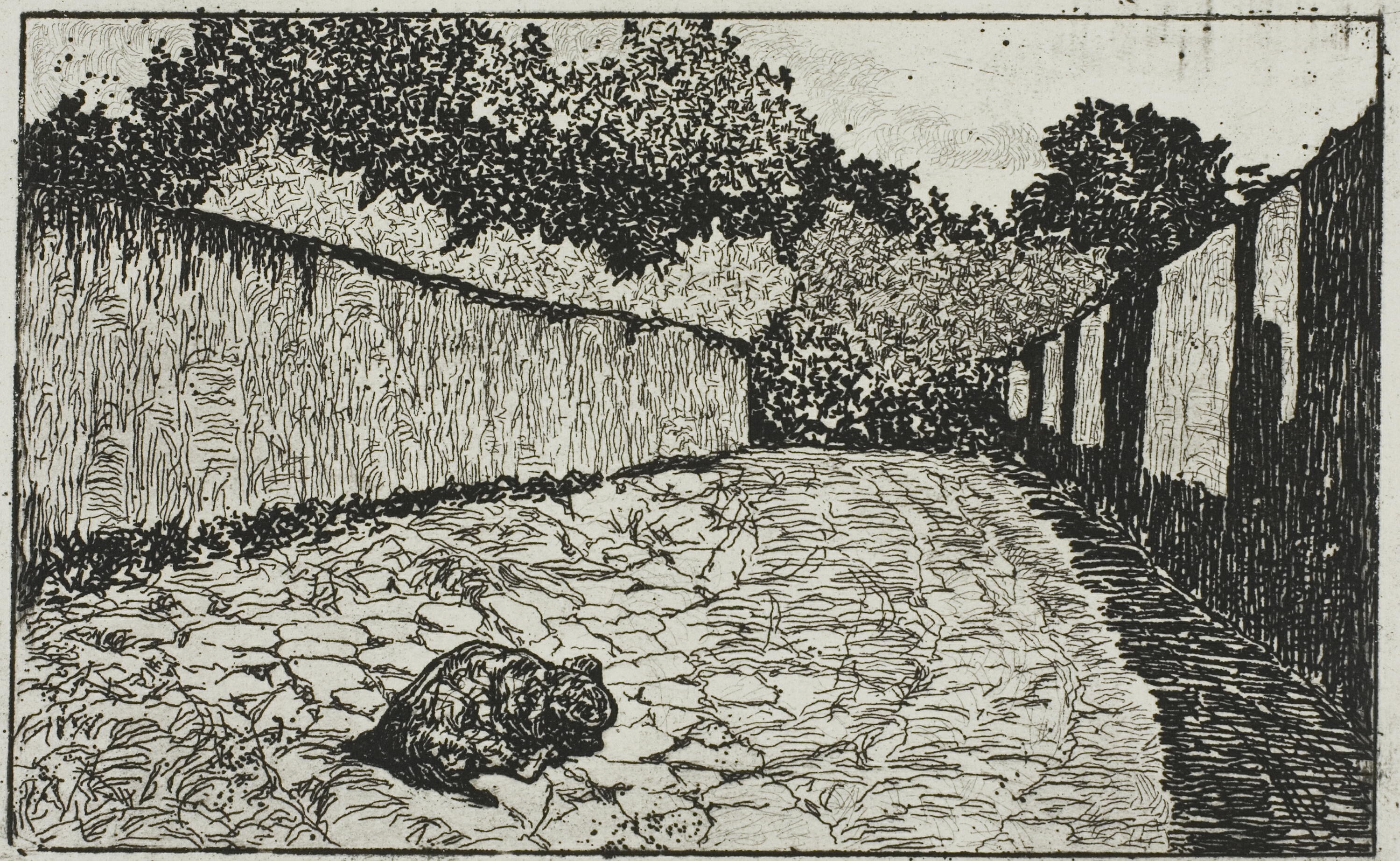
Giovanni Fattori:
Small Street on the Outskirts of Florence with Puppy (1870–75)
" … a perfect portrait of Success."
©2023 by David A. Schmaltz - all rights reserved
Some of this town's streets resemble abstract art, with tar rather than paint swirled in curious patterns on the road surfaces to seal cracks and blemishes. Other streets have become nothing but patches; asphalt opened to replace sewer lines over time and never properly resealed, delivering bumpy rides. A few streets still feature the odd exposed rails of long-ago streetcar tracks, a feature from a hundred years ago I sure wish would come back complete with rattling cars and a turnaround right beneath my window overlooking the center of the universe. These streets carry more than traffic, for they most prominently carry their history, smooth or bumpy, narrow or wide. I suspect that nobody and nothing ever successfully escapes their history, that it remains terribly present for everybody forever, the past much more than mere prologue but continuing as an inescapable part of the present, perhaps as its personality.
I could watch forever as stone masons work on cobblestone surfaces. Their efforts seem so damned evocative of faith in a future and faith in a past, the technology ancient, the effort unavoidably painstaking. In my town, we pour our paving and steamroll it into place. In Prague, Rome, or Paris, they delicately place one carefully carved stone at a time, by deliberate and experienced hands, each stone pounded into a bed of sand, then more sand gets swept into place between the laid stones. The result seems an amazing work of art, a timeless statement, a testament to perseverance as well as patience, a credit to a craft, and an apt metaphor for both the futility and the permanence of human engagement. Roads The Romans built in just this manner remain in use today and in better shape than the best of my town's weathered asphalt and macadam.
The man who designed and built The Villa was the county commissioner who oversaw the first Paving of this valley's roads. Before him, they were dirt, the fine Loess soil that must have been impossible after rains. After, we became a place where farmers could almost always move their grain to the railroad terminals and where the bridges were maintained. He brought this place into the twentieth century. He successfully paved over its past. I marvel at just how full of itself this town and valley became in his time. It had benefited from its fortunate placement as the last steamship stop on The Columbia and at the head of The Mullan Road, which led up into the Idaho Panhandle's gold and silver fields. The only game in the region for supplies and over-wintering, this town prospered on its proximate successes: location, location, and location. That first paving went fast, creating an eternal maintenance situation that continues ad infinitum.
I think of myself Paving my series, painstakingly selecting each stone before carefully pounding it into its base of sand. No two stones are all that similar; each seems unique as if only it could possibly fit into the space intended for it. It appears as if some wise hand guided the discovery and placement, and the stonemasons work as mere agents of that higher power, just like this writer does. The masons crawl on their knees in their profession. I crawl on my fingertips. Both they and I seem almost invisible as we make our selections and placements, a muted tap-tapping accompanying our work. They seem to make no progress as they progress. It must take months for them to accomplish even a modest result. Once finished, few blemishes remain. Their roadway looks pristine, freshly timeless, perfect in its infinite variety, each square inch unique in its apparent sameness, a finished portrait of Success.
——————
A Steampunk Writer
The road to Success never was paved with successes, in the same way that everything apparently originally came from almost nothing. This writing week reminded me of my humble and humbling beginnings, that I began with barely a notion of how to, this week, pass a full third of my way toward finishing this series. Interestingly or not, I remain uncertain of my trajectory, except to say that I feel a tad more confident that my path will continue revealing itself to me. I'd guess that I'm still at least two-thirds uncertain of what the remaining two-thirds of this series might entail, but I feel more confident than when I began that the route through will be revealing itself in time, usually just in time. How many times have I insisted that every series I've written manifested in more or less precisely this way by first challenging my faith in whatever it always was that served up each installment? I am some days sorely tempted to retire from these efforts, which demand that I take no days off and never go idle for the dubious purpose of "recharging my batteries." I'm apparently not battery-powered. Otherwise, they would have expired long ago. I might be a steampunk writer, belching some rough equivalent of coal smoke, coughing, then huff-huff-puffing into, over, and through each installment. I can say that I'm learning plenty.—
Weekly Writing Summary
—
I began my writing week considering what I've been accumulating while considering success with Accshleptance. " I will very likely wind up richer for the effort, but will have even more likely also increased my baggage to the point where I'm just an annoyance to my fellow passengers."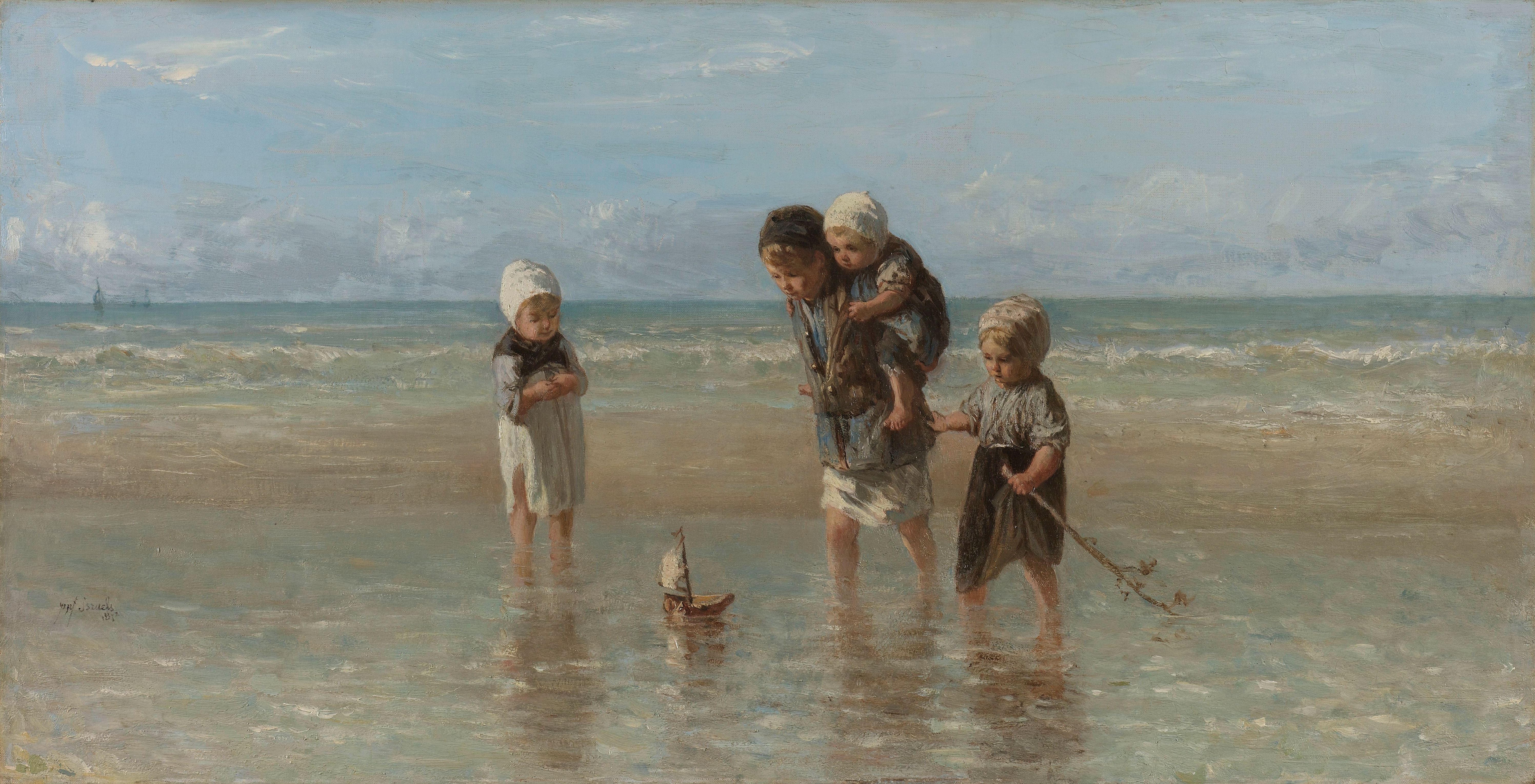
Jozef Israëls: Children of the Sea (1872)
—
I next proposed an unusual metric for determining whether an effort's trending toward a successful finish with PlantingFace. "… the road to Success might be best described as one littered with failures, little and large, followed by impromptu roadside repairs. Probably better to presume that you'll arrive with grease stains on your cuffs."
Albrecht Dürer: St. Christopher Facing to the Right (1521)
—
I next considered Success as an inherently Slippery substance. "It might be that the most passionate pursuits have always been essentially fictions. They are fueled by happily-ever-after objectives, ones which both blind and motivate in perhaps equal measure."
Paul Gauguin: Jean René Gauguin (1881)
—
I next encountered the concept of *Reach, which seemed a little difficult to grasp, though it proved this period's my most popular posting. "To grasp what we could never have Reached seems the most useful insight."
Alexandre Cabanel: Woman Reaching Over a Wall,
study for The Life of Saint Louis, King of France (1878)
—
Building on the prior day's Reach Story, I considered Grasp. "The process weenies insist that a goal must be clear, objective, and measurable, advice I label as clear bullshit. We all know that a decent goal should satisfy almost precisely the opposite of those rational conditions. They're much more broadly palatable if opaque, subjective, and fuzzy, for these conditions better kick our imaginations into conjuring much better than could ever be discretely described."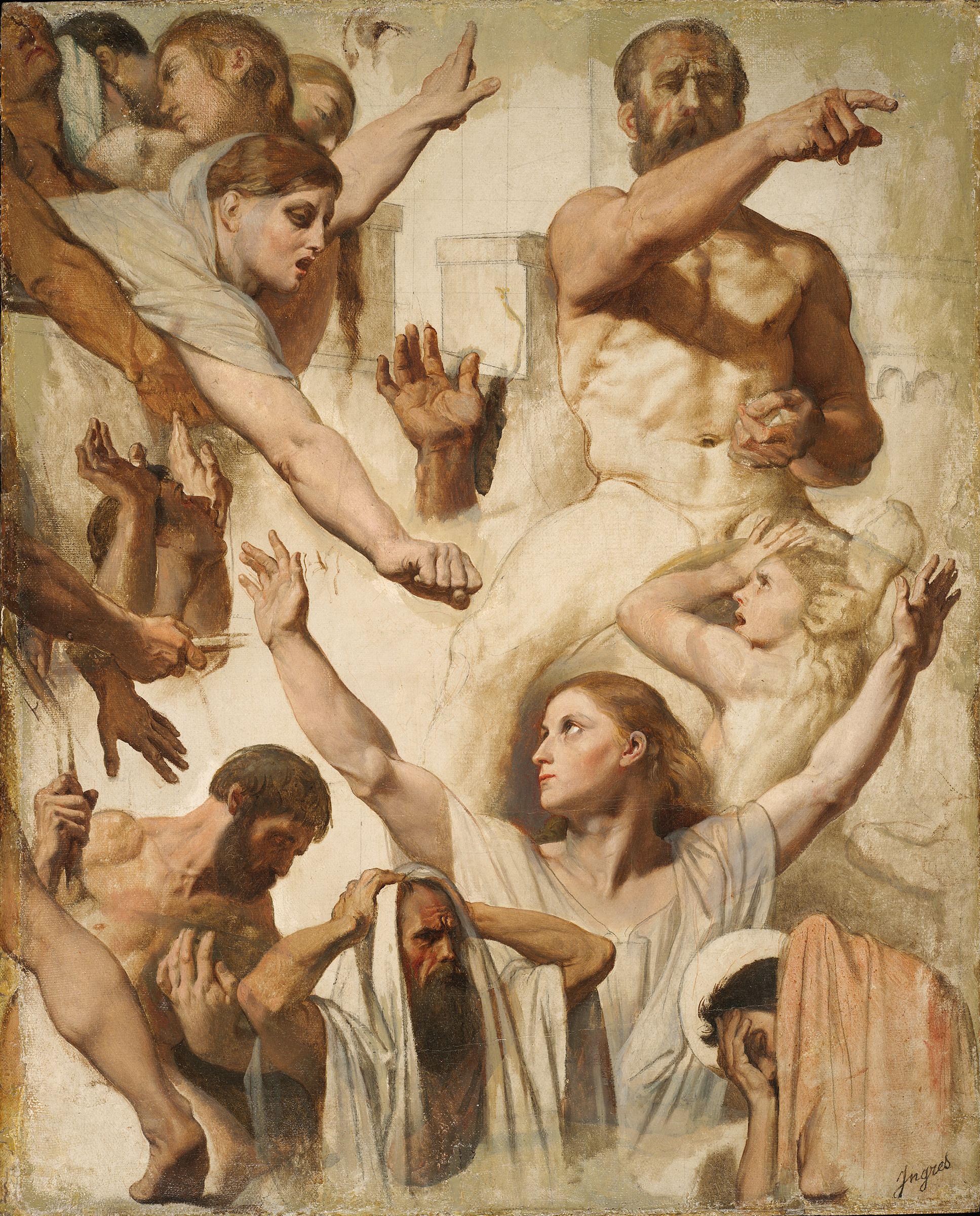
Jean-Auguste-Dominique Ingres:
Studies for "The Martyrdom of Saint Symphorien"
[Saint, Mother, and Proconsul] (1833)
—
I noticed that time moves irregularly forward in Vortices. "I might consider myself blessed that I still remain sensitive enough to sense the disorganization surrounding my effort."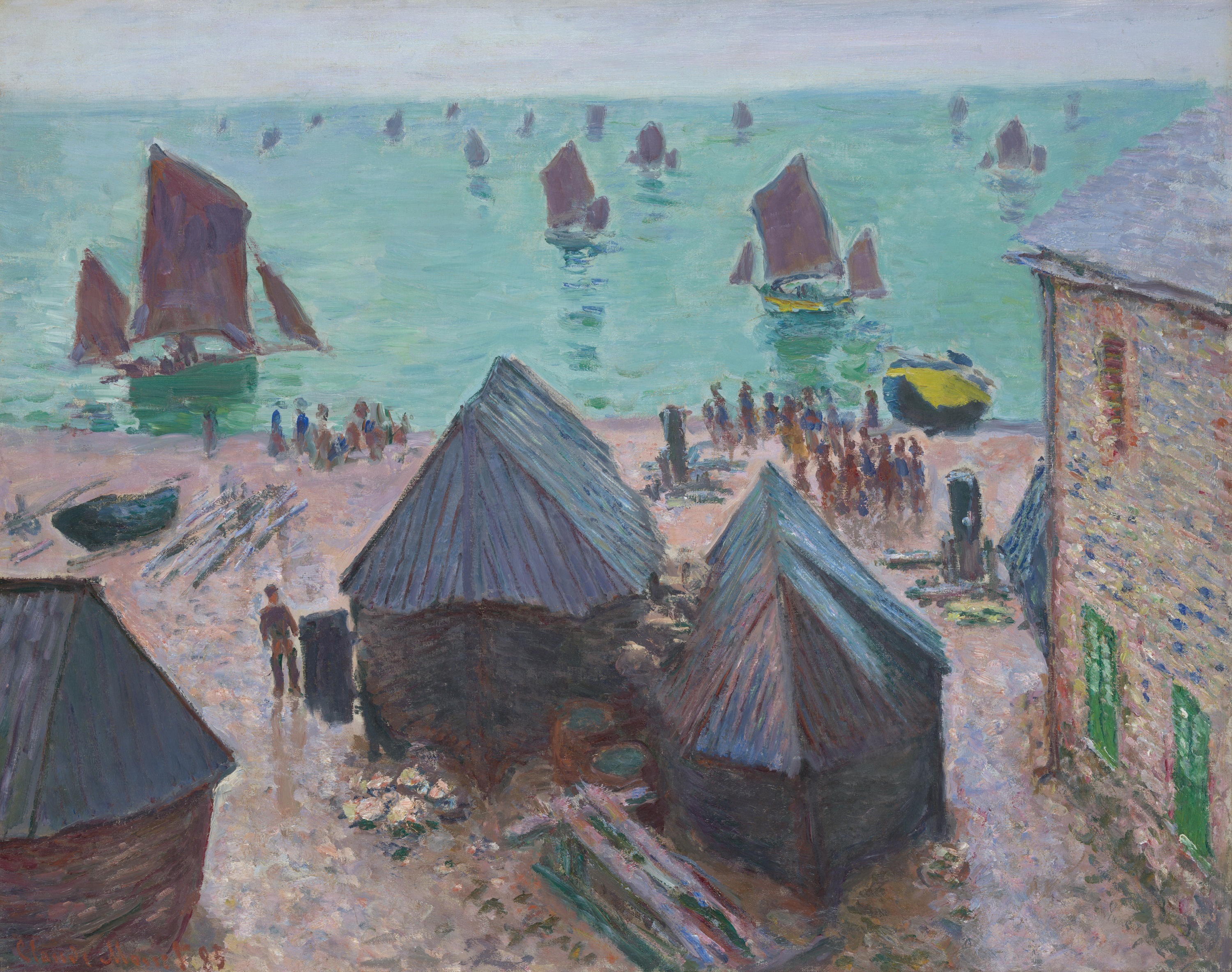
Claude Monet: The Departure of the Boats, Étretat (1885)
—
I ended my writing week considering Success Addiction Disorders (SDAs) in Sexcess. " … it seems as though too much Uppercase Success might just produce much more damage than does too little lowercase success, the kind the rest of us seem to enjoy. A humbling failure or two might well render anyone more generous, more understanding, more accepting of fellow citizens' foibles, while Sexcess seems to harden heart and soul into Scrooge-like forms and render super yachts and private jets into perfectly reasonable purchases."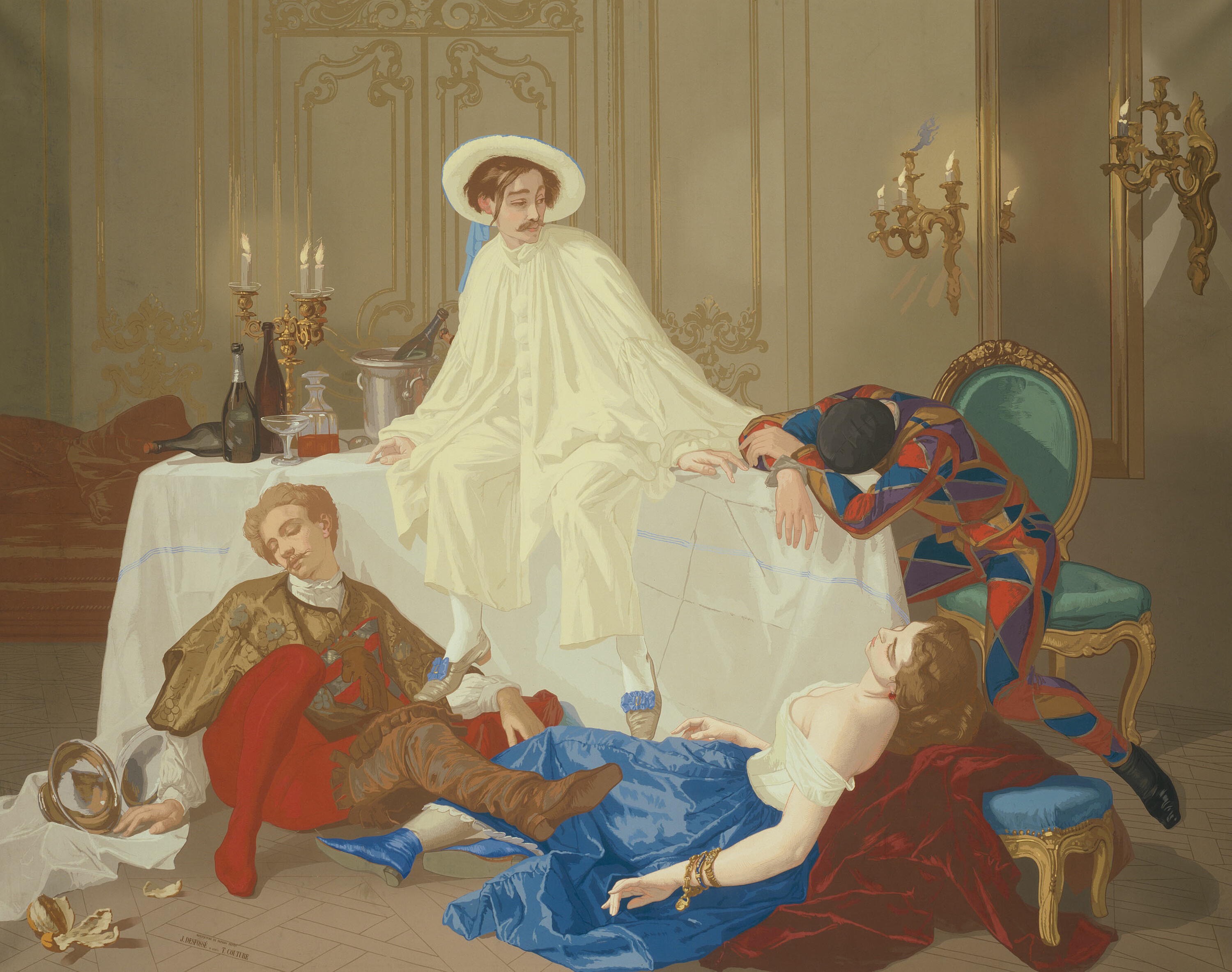
Thomas Couture: The Supper after the Masked Ball (1855)
—
My readership was this week down to its lowest level ever, a condition I suspect was caused by Facebook's algorithm failing to display my posts to my long-standing audience. I am investigating alternative platforms, each requiring a raft of more or less blind decisions. I'm working my way through them. This situation, though, has forced a reconsideration upon me. Would I continue writing if my audience disappeared? Was the purpose of telling these stories ever, really, so that they might be broadly heard? I'm still writing, still creating baggage, still Schlepping it and Planting my Face, climbing up a Slippery slope, testing my Reach, discovering my Grasp, experiencing turbulent Vortices, and, so far, successfully avoiding Success Addiction Disorders.


